Graham Reid | | 4 min read
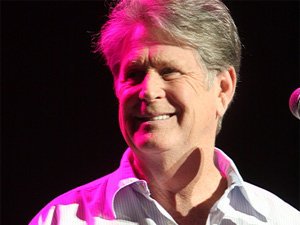
You don't so much interview former-Beach Boy Brian Wilson as ask a question and hope for the best. His answers may be a single word or something abrupt and unhelpful or, if he mishears as he sometimes does, a reply to a question you didn't even ask.
It may be that the curtness comes from him not suffering fools, but asking a lengthy question which gets a one word response, a flat denial or an answer from an odd tangent can make any interviewer feel like a fool.
So rock's most famous living casualty is not an easy subject and sometimes he defines the terms "non sequitur" and "autopilot". You get a very clear impression this man - who suffered a nervous breakdown at the close of the 60s and immersed himself in drugs, food and eventually therapy - is schooled in his responses.
Three-and-a-half years ago in a cold and ugly room backstage at the Sydney Opera House he had "a friend" Jerry with him whose role there - and at the concert that night when he appeared to conduct Wilson from about five rows back in the centre - was to keep Brian focused.
That said, the man whose musical genius guided the Beach Boys from carefree surf songs into the complex arrangements of soft psychedelic pop-rock in the 60s is in a very happy place these days. His years of being an overweight recluse are well behind him and in the past decade he has taken to the road, performing the classic 1966 Pet Sounds album in its entirety and then finishing off, recording and touring the album SMiLE which he abandoned in 1967.
With those put away Wilson seemed to have cleared the decks for a new phase in his career, one bannered by a new album That Lucky Old Sun (reviewed here) which lacks nothing in ambition.
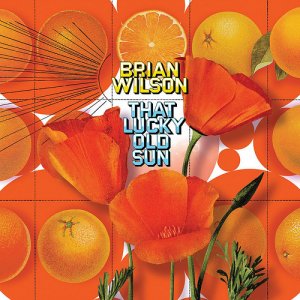 It is a
complex, multi-layered song cycle about his beloved California
punctuated by spoken word narratives, and also has an
autobiographical quality in songs such as Midnight's Another
Day and - in Going Home - lyrics which say "at 25
I turned out the light, 'cos I couldn't handle the fear in my tired
eyes".
It is a
complex, multi-layered song cycle about his beloved California
punctuated by spoken word narratives, and also has an
autobiographical quality in songs such as Midnight's Another
Day and - in Going Home - lyrics which say "at 25
I turned out the light, 'cos I couldn't handle the fear in my tired
eyes".
Curiously these "autobiographical" words were not written by Wilson but by Scott Bennett of his touring/recording band (which Paul McCartney considers "the best band on the road, period"), and his long-time collaborator Van Dyke Parks who also co-wrote with Wilson on SMiLE and the 1995 album Orange Crate Art.
So there is much to talk about with Wilson, now 66, but of course that entails... talking with Brian Wilson. And he mishears the first question about this album being the result of a commission by London's Southbank Centre in September of last year.
He replies by saying Bennett wrote the lyrics and he was very happy with them: "He just interpreted me because he knows me ... each song is just one at a time and each song means something different."
It seems fair to point out just how referenced this album is in Wilson's Beach Boys past, as have been all his solo albums: everywhere are stacked up harmonies and Pet Sounds/SMiLE-styled arrangements, and Forever My Surfer Girl nods back overtly to his Surfer Girl of 45 years ago.
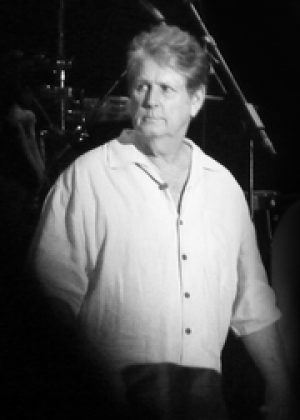 "I wanted people to realise that Surfer
Girl is forever," he says, and of the rather odd Mexican
Girl, which has every Mexican musical cliche thrown in, he says it
was "my attempt to try a Mexican song and give the feeling of
Mexico, and I think we did just that too".
"I wanted people to realise that Surfer
Girl is forever," he says, and of the rather odd Mexican
Girl, which has every Mexican musical cliche thrown in, he says it
was "my attempt to try a Mexican song and give the feeling of
Mexico, and I think we did just that too".
This cycle of songs - "five narratives" is the description he prefers - is more interesting in its final section: it takes a darkly personal turn back to the period of his breakdown after the gentle a cappella Been Too Long into Midnight's Another Day with Bennett's lyrics, "took the dive but couldn't swim ... took the diamond from my soul and turned it back into coal ... all these voices, all these memories ... all these people make me feel so alone".
But bracketed by his interpretation of the old standard That Lucky Old Sun, this paean to California ends on an upbeat note, and Wilson says for him playing piano is like therapy.
"Piano therapy I call it," he declaims loudly.
He has just played dates in Britain and admits that this new music is much better received outside of the United States where the audiences still seem to want a nostalgia act from him. Of course the irony is that although Wilson is performing new music it is very much grounded in his past and deliberately conjures up the Beach Boys music of the 60s.
He even closes this one with "I had a dream, singing with my brothers ..." The brothers are long gone now - Dennis and Carl dead, and he says he is still estranged from his cousin and fellow Beach Boy Mike Love.
But Wilson carries on taking his new music to rapturous audiences and promises to come down to this hemisphere with the touring show of That Lucky Old Sun, as he did with Pet Sounds and SMiLE: "One of my favourite places to go is Australia, the Intercontinental hotel in Australia, a great hotel," he says with enthusiasm.
"I'm in good health and very good mental condition and I'm ready to go to work."
And oddly enough, despite the difficulty in communication, he actually sounds it.
There are a number of Brian Wilson and Beach Boys interviews at Elsewhere as well as concert and album reviews. Try starting here.
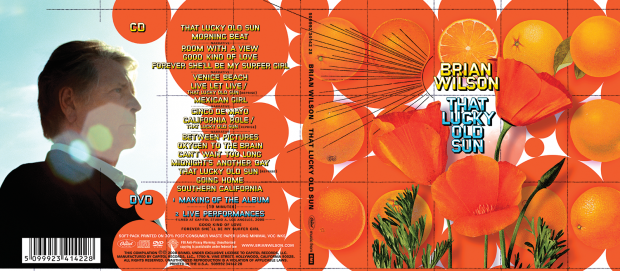

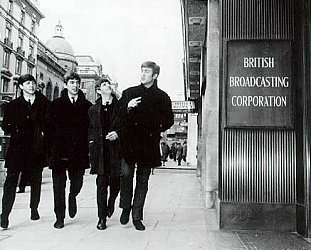

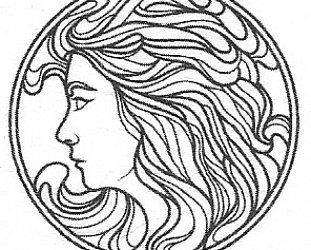
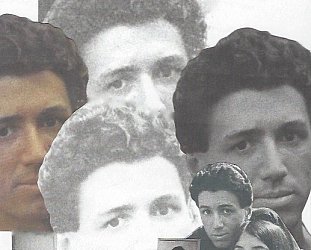
post a comment